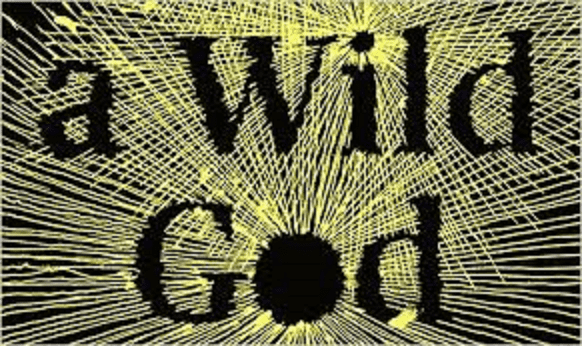Every fall I spend a week with over one hundred freshman exploring the familiar but challenging stories of Genesis and Exodus. Each year I’m in a different place and the students have different interests, backgrounds, and prior experience with the texts, so each time “all things are become new.” Our frequent focus is on the problem of how to make contact with the most important force in the universe in a meaningful way when, virtually by definition, that force is unknowable. The God of the Old Testament stories wants simultaneously to have an intimate relationship with apparently random groups of human beings and individuals, yet frequently falls back on the “I’m God and you’re not” position when things get dicey (such as when human beings start asking tough questions).

One fall around this time, a friend of mine from church who also is a regular at the monthly seminars I lead afterwards asked me whether I had ever read Barbara Ehrenreich’s Living With a Wild God. I had not, and honestly had never heard of the book (although the title alone made me want to read it immediately). “Put it on your list,” said my friend. “I want to know what you think of the end of the book.”
I found the book to be equal parts interesting, annoying, and incoherent. As Ehrenreich, best known (to me, at least) for her best-seller Nickeled and Dimed, wanders back in time to her dysfunctional childhood and tries to pick up a thread of investigation now that she is in her early seventies that she dropped many decades earlier, she frequently gets lost in the jungle that threatens everyone who writes about themselves—the temptation to believe that just because it happened to me, it’s interesting and important to someone else. The fine line between fascinating memoir and suffocating self-absorption is often close to invisible.
I should have loved the book, given that it is (roughly) the story of an atheist trying to come to grips with what can only be described as a series of “mystical experiences” that occurred over a few years in her late teens and early twenties. Right up my alley—sounds exactly like what God would do, send mystical experiences to an atheist while giving well-intentioned believers the silent treatment. But it wasn’t until the final chapter when I realized why the whole thing just wasn’t clicking with me. Ehrenreich writes:
I have no patience with Goethe when he wrote, ‘The highest happiness of man is to have probed what is knowable, and to quietly revere what is unknowable.’ Why ‘revere’ the unknowable? Why not find out what it is?
“Aha!” I thought. She’s trying to play the “seeking after God” game using a set of rules that guarantees that she will lose the game. That’s like playing Monopoly using rules that guarantee you’ll not proceed past Baltic Avenue. Never a good idea.
Ehrenreich was trained as a scientist and came from a family with no regard for religion, so her categories of explanation for everything are objective evidence, provable fact, and calculating reason. She lacks the common vocabulary for even beginning to communicate about experiences that apparently do not fit into these categories, but that doesn’t stop her from trying. And it is a heroic effort throughout, regularly teasing the reader with impending breakthroughs in understanding—when she’s not spending page after page telling us about her love affairs, her immersion in sixties radicalism and a variety of stop-and-start careers, that is. But I hung in there because I was hoping for a big payoff of some sort—Barbara Ehrenreich meets the Divine.
In her final chapter, the one in which I hoped she would tentatively draw a line between the knowable and the unknowable as her experiences have led her to draw it, Ehrenreich instead unfavorably quotes the above passage from Goethe, then proceeds to speculate randomly about the “wild God” who has been lurking around the fringes of her rational and logical life ever since her mystical experiences as a teenager.
Maybe God is the Presence we occasionally found ourselves in the middle of while experiencing natural beauty. Maybe God is a creation of the “Hyperactive Agency Detection Device” that cognitive scientists say our human brain comes equipped with, a device that predisposes us to project consciousness onto things other than ourselves, including rocks and trees. Maybe God is like a germ or a virus, not really alive but pervasively invading the various cracks available in living things. Or, I might add, maybe God is a Flying Spaghetti Monster, since apparently once one starts speculating beyond the boundaries of logic any guess is as good as any other.
“Why revere the unknowable? Why not find out what it is?” In the end, I find these questions to be sad, simply because the continuing assumption behind the questions is that everything, and I mean everything, is subject to not only logical scrutiny (that’s fine) but also the assumption that only those things that are at least in theory within the range and scope of human reason are worthy of even a moment of human attention. It is as if we have no other tools available for engaging with and trying to shape a meaningful life within the world we find ourselves so unexpectedly placed.
The other day I made the rare choice to get involved in a Facebook discussion. In response to my resistance to his universal claim that “Religious faith is bad,” a Facebook acquaintance (whom I’ve never met) said “Faith is belief without evidence. What else does it mean? Why else would it be needed?” My quick and inadequate response was “Faith is not belief without evidence. Faith is belief when evidence may point in a particular direction but is not complete or exhaustive. Belief entirely without any evidence at all is simply foolishness. That foolishness is not confined to religious activities–it is rampant in politics or any other arena of belief. Non-theists are just as capable of such foolishness as theists are.”
As long as faith opponents are rejecting a definition of faith similar to Mark Twain’s “Faith is believing something you know ain’t true,” I’m with them. But that’s not what real faith is. Rather, it is applying the very common human activity of believing on the basis of important but partial evidence to the realm of the relationship between human and divine. “Faith is the substance of things hoped for, the evidence of things not seen” wrote the author of Hebrews. The relationship between faith, evidence, knowledge and hope is one worthy of extended investigation—perhaps a sabbatical?? But to assume that faith and evidence have nothing to do with each other is to define the game out of existence—or to guarantee advancing no further than Baltic Avenue.













